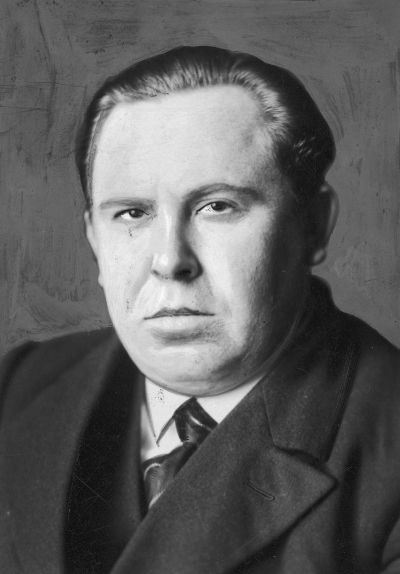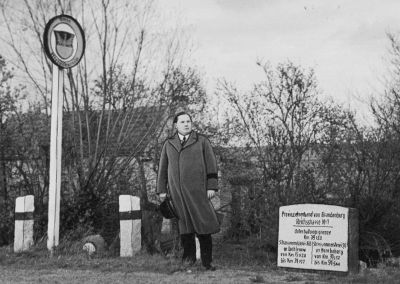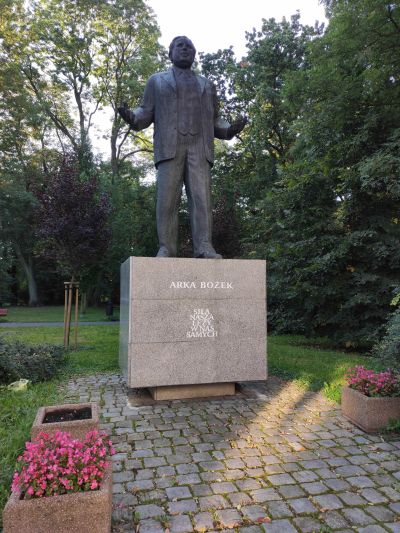Arka Bożek – Polish minority activist in Silesia, politician and publicist

Arka Bożek saw no reason to remain in exile after the end of the war. He missed his family and his homeland tremendously and wanted to play a part in the process of integrating the Silesian territories into the new Poland. After a Polish government had been formed under the auspices of the ‘Big Three’ (Soviet Union, USA, Great Britain) and with the participation of the former Prime Minister in exile, Stanisław Mikołajczyk, Bożek decided to return at the beginning of July 1945. He joined Mikołajczyk’s party, the Polish Peasant Party (Polskie Stronnictwo Ludowe, PSL). In mid-August, he was appointed deputy voivode of Silesia. The Silesian activists supported the appointment and the people of the Opole region welcomed him with high hopes. Bożek was responsible for important departments: agriculture, healthcare, food supply, communication and estimation of war losses. He was particularly interested in the course of the national review and the settlement programme. He wanted to ensure that these were carried out fairly; nevertheless, he advocated for the complete expulsion of the Germans. Bożek believed that mere membership in National Socialist organisations due to partially being forced to join should not be a reason to reject an application for recognition of Polish citizenship from Silesians. He himself would repeatedly issue certificates of Polish citizenship to people he had known before the war and intervened in favour of the local population on a number of occasions. These activities displeased the Communists, who even accused Bożek and other Silesian activists of defending German nationalism.
The most important issue for Bożek was the integration of Silesia into Poland. He was convinced of the need for Poland to develop and maintain the “regained territories”, regarding this as an act of historical justice. He was less interested in other political issues of the time or underestimated their importance. Bożek quickly distanced himself from the politics of the PSL and became involved in the Peasant/People’s Party (Stronnictwo Ludowe, SL), which was a subordinate party to the Communists. He was involved in propaganda activities relating to the western territories and the course of the border. In the parliamentary elections in January 1947, which were rigged by the authorities, he won a seat as a member of parliament. After the so-called “Unification of the Peasant Movement”, Bożek found himself in the United Peasant Party (Zjednoczone Stronnictwo Ludowe, ZSL) in 1949. Time and again, he emphasised the importance of the social reforms that had been introduced, which for him represented a democratisation of life and a path to the emancipation of all social classes. It seems that Bożek sincerely believed in these slogans, and his critical views of the Polish elite, which he brought back from exile, even encouraged him in his decision to collaborate with the Communists. He was convinced that Germany continued to pose a threat to Poland.
Towards the end of the 1940s, the Communists’ attacks on Bożek intensified. They had already begun to purge Silesian activists who had been active before the war from the party or to marginalise them. The security apparatus had monitored them, including Bożek, from the very beginning. According to the mechanism of Stalinist criticism, Bożek became a masked enemy, a disruptive factor in the efforts to create a socialist society. He was dismissed from his post as deputy voivode at the end of August 1950. This was a bitter time for Bożek, who was in poor health. He was also disappointed by the consequences of the incorporation of the Silesian territories and the unjust treatment of the indigenous population. Bożek remained a member of parliament until 1952, but was no longer able to appear as actively in public as before. He was attacked in the press. As he was prevented from working due to illness and was dependent on his children, he was only granted a small pension in 1953. He died on 28 November 1954.
During the period of de-Stalinisation, people began to remember Bożek – also thanks to Edmund Osmańczyk. Bożek’s memoirs were published. A memorial plaque was unveiled in Markowice in 1958. Streets and schools were named after him, as was the radio station in Opole. The first biography of Bożek by Ryszard Hajduk was published in 1963. During the 1970s, when the Communist authorities were looking for heroes outside the Communist pantheon and used Silesian themes in their propaganda, Bożek was a popular example. A memorial room (izba pamięci) dedicated to him was set up in Markowice. A monument to him was unveiled in Racibórz in 1980, with a fragment of his speech after his return home in 1945 placed on the plinth: “Our strength lies within ourselves.” After the political upheaval of 1989, Bożek was accused of having supported the Communists and of being a careerist. Nevertheless, his character and achievements were also honoured, including with a memorial plaque in Bytom in 2022. New books were written. In 1941, while in exile in London, Bożek himself described his path in life as follows:
“I was neither a saint nor a bastard. I was a mere mortal with a simple peasant mind who had the misfortune to live in the world in such crazy times. Heaven and fate drove me as they pleased, and that is why I was talked about. There’s only one thing I can blame myself for, and that is that I didn’t resist my fate.”
Małgorzata Ruchniewicz, August 2023
Literature (selection)
- Gmitruk, Janusz / Ratyński, Mateusz: Arka Bożek (1899-1954) i jego czasy, Warszawa 2022.
- Hajduk, Ryszard: Arka Bożek, Warszawa 1963.
- Kisielewicz, Danuta: Arka Bożek (1899-1954). Działacz społeczno-polityczny Śląska Opolskiego, Opole 2006.
- Masnyk, Marek: Dzielnica I Związku Polaków w Niemczech 1923-1939, Opole 1994.
- Nowak, Alfred: Działalność Arki Bożka w latach 1945-1954, Racibórz 2001.







